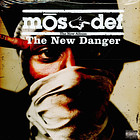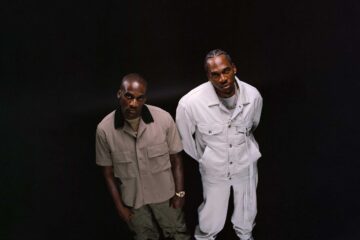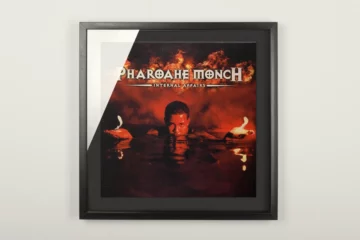Mos Def, the man with the cute dimples, the head of the students’ union’s favourite rapper, who created beacons of conscious/backpack rap (both in inverted commas, of course) at the end of the millennium with »Black On Both Sides« and »Black Star« (with Talib Kweli).
Mos Def, the accomplished lyricist.
Mos Def, the former bookshop owner.
Mos Def, the harmless man.
It was then, 19 years ago, that he released his second studio album, posing for the cover masked in a blood-stained cotton cloth, one finger on an invisible trigger, the other on his temple.
The kind of reception that immediately signals the difference between a début and a follow-up and perhaps should have forewarned fans.
On »Black On Both Sides«, the familiar portrait of Mos Def: high contrast, slightly tinted in yellowish-red, Mos Def with a knowing smile on his lips and a faint hint of sadness in his eyes.

The New Danger
On »The New Danger«, the rapper poses in front of a white and grey background. Here, the head slightly tilted forward, the FUCK YOU?!! posture, an articulation somewhere between tiredness and aggression in its expression. The eyes of a man who has had enough. Two portraits that could not be more different in the way they confront the viewer.
As so the music. Fans wanted more »Umi Says« and »Definition« etc. Instead they got 75 minutes of a crude, unfocused mix that at its heart yearned to be rock n’ roll. Black Sabbath, Bad Brains, Pantera and Fugazi were Mos Def’s reference points at the time.
And suddenly everyone was naked
Ah, the early 2000s. A fun time in hip hop. A lot happened back then, a lot that was new – and a lot of R&B. Usher, Kelis, Beyoncé, Alicia Keys, Christina Milian, Mario fucking Winans, all naked. CD sales boomed for a few years, and rap and its ilk took over the charts. In January 2003, 50 Cent was suddenly booming from the rafters, ushering in a new era. Also naked. The nineties were over at the latest at this point. For golden era die-hards, it wasn’t all that funny really, their style of dress was heavy on fabric, their heroes mostly mired in the old millennium – and those who had made it over to the other side were clearly no longer in the mood for rap. These two experiments more or less adeptly with the genres. Q-Tip, Common, André 3000.
As does Mos Def as well in 2004 on »The New Danger«.
Central to this, and very clumsily executed, is his attempt to establish something like ghetto rock as a brand with this album. It makes you stop wanting to lash out, it sounds so innocent and naive in places.
»Freaky Black Greetings« and »Zimzallabim« greet you with riffs that make you want to take another look at the cover just to make sure: Did I really put Mos Def on, or maybe just good old »Chocolate Starfish«? From today’s vantage point, »Blue Black Jack« sounds like Robin…Thicke … sorry… – like a white man’s blues song. The zeal reaches its climax late in the album with the ode to Rage Against The Machine on »War«, which lacks detachment and original interpretation.
Double the dose in half the time
It’s just the process of growing, after all. While »Black On Both Sides« was pure self-understanding – a classic début, the only album the artist could have made at the time – »The New Danger« clearly shows that its performer had the material for several albums inside him in 2004. Hybrid, ambitious, ultimately chaotic. A stepping stone. One that led to the release of »True Magic« two years later, a highly underrated Mos Def album, as well as »The Ecstatic« five years later, a well-rounded and worthy conclusion to his discography.
But »The New Danger« was in no way crap. In no way at all. It has »Sex, Love & Money« on it. That atmospheric overtone, with an instrumental that Jóhann Jóhannsson must have composed for Magic City in between. His flute sample is one of the hottest around. On »Sunshine«, Mos Def’s Rawkus version refines one of the most indifferent Kanye beats of the era. »Close Edge« is not a Neptunes beat, but it sounds like one. »The Panties« and »Modern Marvel« are sexy with the resting-pulse eroticism of Mos Def’s best tracks. »The Beggar« is, if you want to go overboard in your feuilleton, the unofficial template for »Love Lockdown« and, from that point of view, nothing less than the blueprint for a song that should be destined to change pop music.
»The New Danger« lacks this definitive status. It’s difficult to give it a permanent place. But it’s almost impossible to forget.









